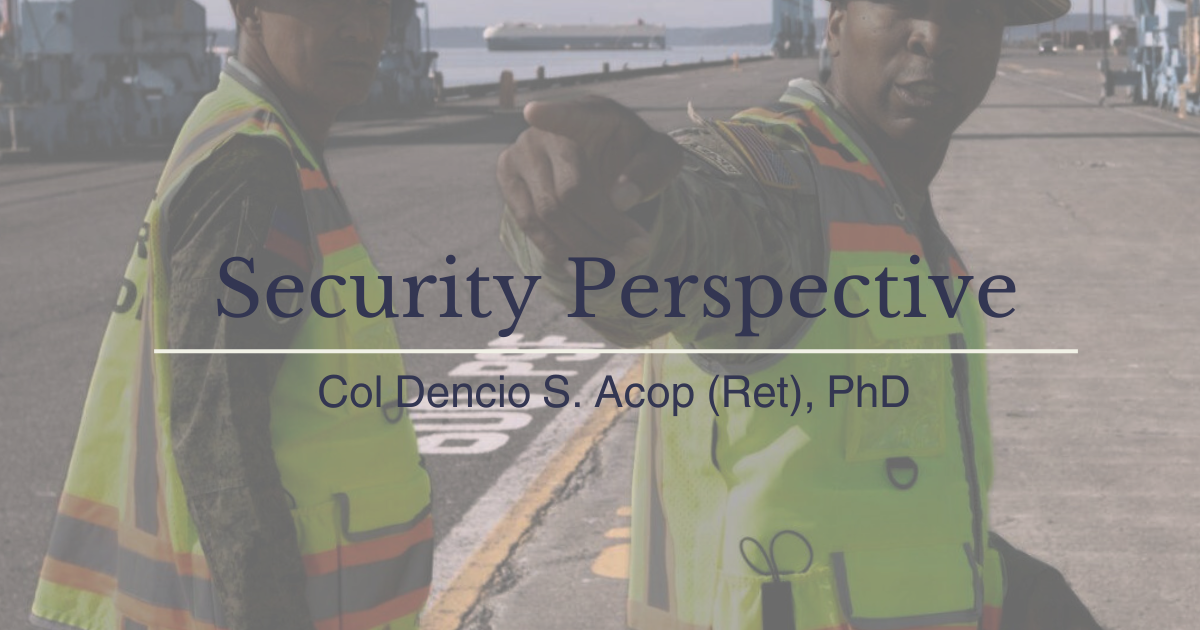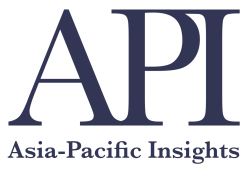The Security Situation in the Mining Industry: Challenges and Opportunities

By Col Dencio S. Acop (Ret), PhD, CPP | Date 09-27-2024
PERTH, AUSTRALIA — Gold is here to stay! It is a saying that goes without saying as the precious mineral will continue to be the standard that makes the world go round. It also resounds with a reality on the planet that will never go away as it represents pretty much all the tangible aspirations of man.
Ever since man discovered the precious metal along with other like valuables, the mining industry has grown to encompass anywhere in the world where there are these natural resources to unearth. Currency will just be paper without the valuable minerals to back it up. Even cryptocurrency will only be empty cyber-transaction without something tangible and desirable lying at its core.
Along with trade, mining has even more fundamentally allowed humanity to acquire material goods for survival. It has enabled wealth to grow in order to profit from more wealth. And this wealth has allowed mankind to flourish with all the basic needs and amenities that money can buy. The more wealth is shared to the last man, the better. But the mining industry today is not without its challenges which also bring about opportunities.
There are the usual security threats of all kinds, environmental damage, and diverse socio-cultural and even political concerns. In turn, these challenges give rise to new opportunities on how to deal with them like artificial intelligence and machine learning as well as blockchain and effective regulations.
Let’s first tackle the threats. Firstly, the mining industry continues to be beset by all kinds of security threats that will never go away as mining operations continue anywhere on the face of the earth or even underneath it. Mining operations are often conducted in remote and hazardous environments, so protecting employees and equipment from theft, damage, and vandalism is always critical.
Mining companies are often targets for cyber espionage campaigns as they generate confidential data that competitors and some countries want to steal. Cyberattacks can also interfere with the interconnected systems and automation that mining operations use, leading to costly business discontinuity and safety risks. Mining companies also face threats from illegal mining operations and intrusions. Another threat is land disputes. Land titling and registration can be poorly defined, leading to land-grabbing and disruptive encounters with local communities and indigenous peoples that can easily turn violent.
Secondly, there is the issue of environmental damage caused by some mining operations. This issue can hurt both the mining industry as well as the impacted communities in particular and the rest of the world in general. The people directly affected by mining operations often decry the threats posed by environmental damage that adversely impact their health and way of life.
The literature is replete with such cases wherein lawsuits had been filed against mining entities by impacted communities. There was this case of a multinational mining operation somewhere in Southeast Asia where massive floods hit a nearby community. The people blamed the mining operation for causing the unprecedented flooding prompting around 300 machete-wielding locals to attack the mining company presence there. On a larger scale, the world today has become a lot more sensitive to environmental damage that eventually affects us all.
The mining industry plays a critical role in carbon emissions globally. It occurs because of the nature of mining processes that often involve heavy machinery, extraction, and processing of minerals, all of which consume large amounts of energy. The industry contributes to climate change from directly emitting significant amounts of greenhouse gases through its operations. Mining activities can also indirectly contribute to emissions through land use changes and the transporting of extracted materials. While mining is essential for extracting materials needed for renewable energy technologies like wind turbines and solar panels, the mining process itself can still generate significant emissions.
Thirdly, diverse socio-cultural and even political concerns can adversely impact the mining industry. Mining operations would be much simpler if mining companies didn’t have to deal with local communities situated near their areas of operation or the larger bodies concerned about environmental degradation. But the reality of it is that this is often not the case. The world has shrunk into a global village.
There is no news left unheard even in far-flung areas. News travels fast in the digital space. Mining companies can no longer keep their operations silent. They can only deal with socio-cultural and political adversities by being transparent and whip-up win-win strategies that keep everyone happy. Local communities are naturally passionate about their agricultural livelihoods based on land and water, traditional way of life, and territoriality.
They do not wish to have foreigners coming in and disrupting their peace – probably even causing them to be displaced. But there is also the harsh reality of corruption – certain stakeholders giving and taking illegitimate money to get what they want. Corruption in the mining industry undermines the rule of law and denies governments revenues.
But while the industry is saddled by challenges, the same difficulties also give rise to unprecedented opportunities unseen in earlier centuries. The first of these opportunities is artificial intelligence and machine learning. The revolutionary technologies of AI and ML are transforming industries through the generation, deployment, and processing of integrated data that would have taken years to analyze.
Automated insights from deep learning are making data obtained from the field not only analyzable but actionable. Aramco, for instance, is now using the new technologies to radically transform its oil industry operations enabling the company to achieve unprecedented performance targets: decreasing costs by 30%, increasing efficiency by 40%, and improving overall productivity by 19%. Working 24/7, its AI deployments including UAV surveillance of its massive pipelines across hundreds of miles of Saudi desert have effectively transformed Aramco’s field operations to transcend previously impossible hurdles.
In the security industry, AI and ML are gradually being deployed to integrate with existing systems toward developing integrated data that is not only proactive but predictive of threats. While there are still gaps that need to be addressed concerning the radical technologies, AI and ML can also work for the mining industry as it does for the oil and security industries.
The second opportunity is blockchain. The new technology of blockchain allows for the secure and transparent sharing of information using a decentralized database. It is a kind of distributed ledger technology (DLT) using a chain of blocks to store data in chronological order. Blockchain can be decentralized, immutable, secure, and transparent. Through decentralization, the power to update a blockchain is shared among the participants in a network, rather than being controlled by just one entity.
Being immutable, the data in a blockchain is unalterable as the chain cannot be modified without consensus from the network. Blockchain is secure as it uses cryptographic techniques to verify transactions and prevent unauthorized entries. Being transparent, blockchain allows for transparent information-sharing within a business network.
For instance, blockchain can allow mining companies to track and trace mine resources throughout the supply chain from source to end use. This ability is of paramount importance especially when dealing with materials sourced from unregulated areas. Blockchain’s data-sharing can enable mining companies to not only proactively address potential problem areas existing in a shared locale. It also allows the companies to do predictive analysis of futuristic outcomes and conduct simulations of possible courses of action and decision-making.
Finally, the third opportunity is lobbying for more effective regulations to influence the operating environment for more win-win outcomes benefiting all stakeholders. I really do not wish to get into the grain of public policies impacting the mining industry.
First of all, there are too many of them. Second of all, they vary from state to state and from country to country. Third, the policies themselves are not the issue I wish to point out here more than the implementation of such policies. Policies are critical not so much for their content but how they are implemented. They come and go with some amendments here and there as time dictates, but there are indeed policies out there regulating every field of endeavor including mining.
But a closer look at mining operations anywhere will tell us that implementation gaps always exist regardless of existing laws. Take the case of mining operations in Indonesia for instance. Indonesia has always been known for its mining industry along with countries like Australia and the United States as well as continents like Africa.
The mining industry in Indonesia faces a number of challenges, including: environmental damage, social issues (displaced communities, disrupted livelihoods, increased social inequalities), illegal mining (some 2,645 illegal mining locations across the country), corruption, and skills gaps. In fact, the environmental damage and human rights violations by some mining companies, and the conflict with the local people in the affected areas, have jeopardized the image of the national mining industry as a whole and still present a major issue for the national mining industry in the future.
In conclusion, the complexities present in the modern world today present unprecedented challenges as well as opportunities for the global mining industry. The challenges besetting the industry include: Security threats that will never go away so long as there are mining operations; The issue of environmental damage; and Diverse socio-cultural and political concerns. These challenges also encourage the development of pioneering solutions to address them.
Such solutions include: The development and deployment of artificial intelligence and machine learning; Blockchain; and lobbying for more effective regulations to influence mining policy implementation. The world is ripe for radical technologies innovating all industries including mining. As the founder of Bold Capital said: “There will be two kinds of companies at the end of this decade: those who are fully utilizing AI and those who will be out of business”.
Tags: Security
